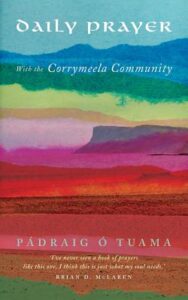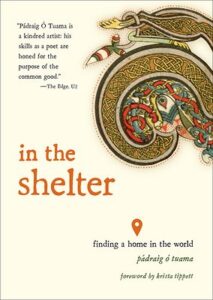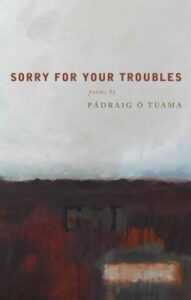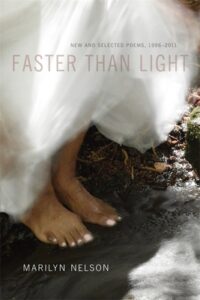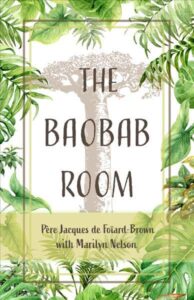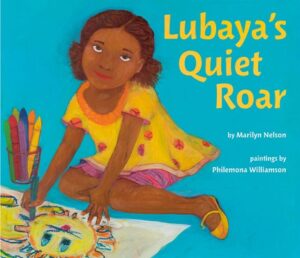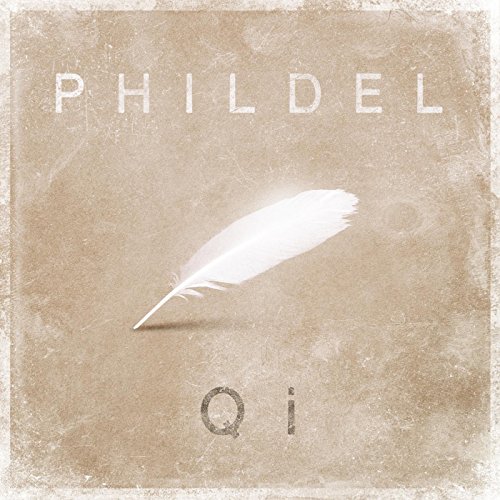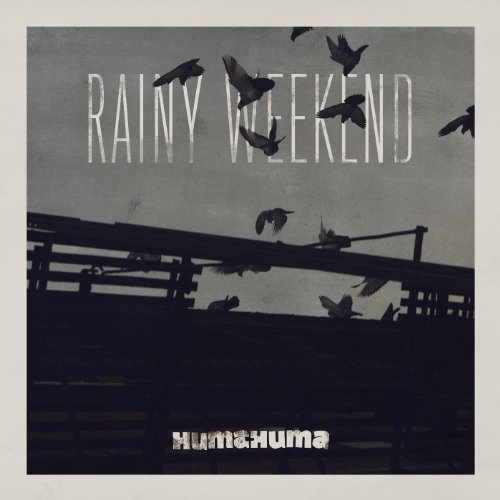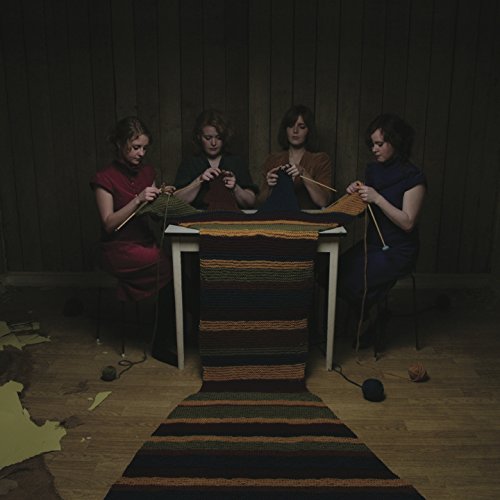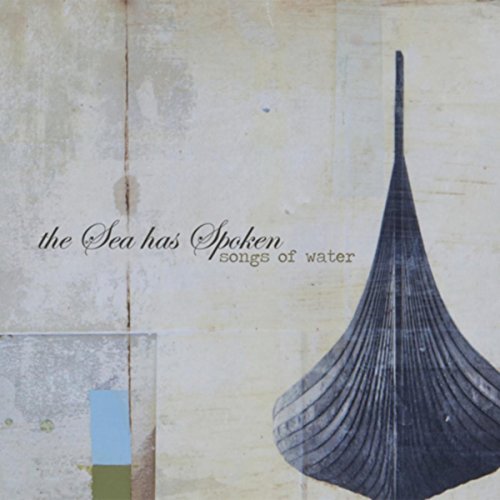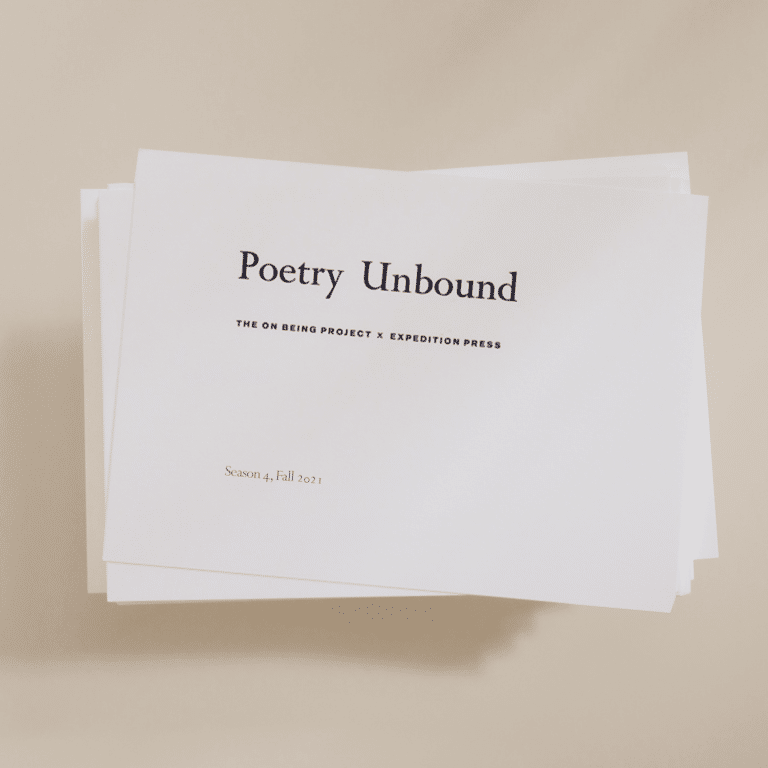Pádraig Ó Tuama and Marilyn Nelson
“So let us pick up the stones over which we stumble, friends, and build altars”
Where to turn to find my place of standing when it feels like the world is on fire? This question surfaced in a public conversation Krista had just a couple of years ago with Pádraig Ó Tuama and Marilyn Nelson, two poet-contemplatives. Pádraig weaves together social healing, poetry, and theology. Marilyn is a lyrical excavator of stories that would rather stay hidden — yet as she coaxes them into the light, they lead to new life. This conversation is a pleasure and balm, and a reminder that the ruptures and unease and reckonings of what we call “this moment” were all before us before the pandemic. Pádraig and Marilyn’s offerings are beyond wise, and distinctly tender and powerful for this now.
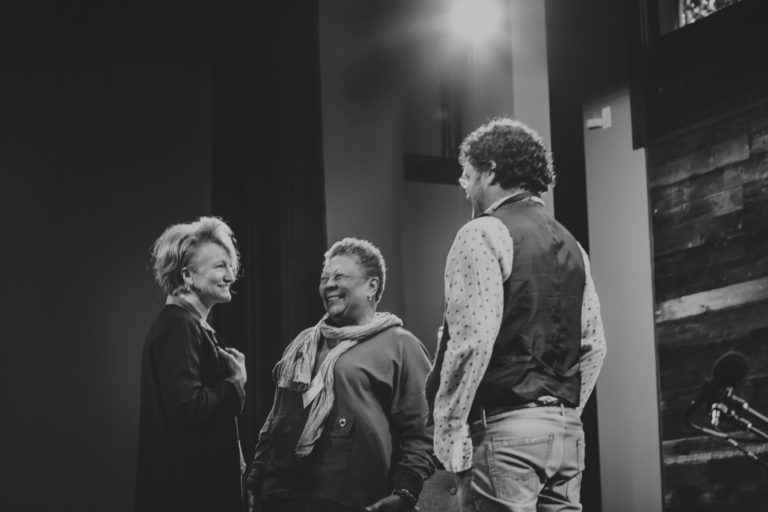
Image by Bethany Birnie, © All Rights Reserved.
Guests
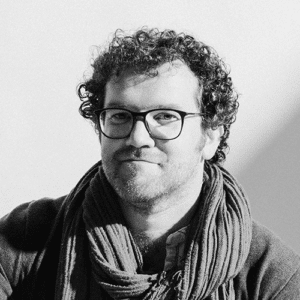
Pádraig Ó Tuama is a theologian, writer, and conflict transformation practitioner. He is a member and former leader of the Corrymeela Community of Northern Ireland. His books include an incandescent memoir, In the Shelter: Finding a Home in the World; a prayer book, Daily Prayer with the Corrymeela Community; a book of poetry, Sorry For Your Troubles; and a book of theology and politics co-authored with Glenn Jordan, Borders & Belonging. He hosts the On Being Studios podcast Poetry Unbound. His forthcoming book, Poetry Unbound: 50 Poems to Open Your World, will be published in October 2022 and is available for pre-order wherever you get your books. Pádraig grew up in the Republic of Ireland, near Cork.
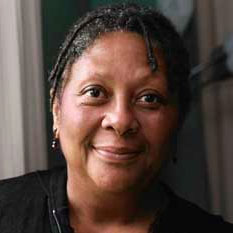
Marilyn Nelson was born in Cleveland, Ohio, the daughter of a school teacher and a U. S. serviceman, a member of the last graduating class of Tuskegee Airmen. She is the author or translator of more than 20 books and chapbooks for adults and children. A professor emerita of English at the University of Connecticut, Marilyn was Poet Laureate of Connecticut, 2001– 2006, and founding director of Soul Mountain Retreat, a writers’ colony, 2004-2010.
Transcript
Krista Tippett, host: Where to turn, to find my place of standing, when it feels like the world is on fire? This question surfaced in a public conversation I had just a couple of years ago with two poet/contemplatives, Pádraig Ó Tuama and Marilyn Nelson. They have both been quiet, vivid inspirations and teachers, to me and to many — Pádraig bringing social healing, poetry, and theology together; Marilyn, a lyrical excavator of stories that would rather stay hidden, yet as she coaxes them into the light, they lead us to new life.
It was a deep pleasure and a balm to sit with them together, and you’ll feel that. What astonishes me in listening back is how this entire conversation becomes a reminder that the ruptures and unease and reckonings of what we call “this moment” — and I’m as guilty as anyone of overusing that phrase — all of it was before us before the pandemic. Pádraig and Marilyn’s offerings are beyond wise, and distinctly tender and powerful for this “now.”
Pádraig Ó Tuama: “So let us pick up the stones over which we stumble, friends, and build altars. Let us listen to the sound of breath in our bodies. Let us listen to the sounds of our own voices, of our own names, of our own fears. Let’s claw ourselves out from the graves we’ve dug. Let’s lick the earth from our fingers. Let us look up and out and around. The world is big and wide and wild and wonderful and wicked, and our lives are murky, magnificent, malleable, and full of meaning. Oremus. Let us pray.”
[music: “Seven League Boots” by Zoe Keating]
Tippett: I’m Krista Tippett, and this is On Being. This conversation unfolded at the On Being Gathering, at the 1440 Multiversity, in Scotts Valley, California.
[“Seven League Boots” by Zoë Keating]
So Marilyn Nelson was born in Cleveland; grew up in a military family. I love — there’s one place where you talk, I remembered this; you tell me if I’m making this up — that when you and your sister, when you would move on to new places, because you moved around a lot, that you would imagine that the places you lived before didn’t exist anymore.
Marilyn Nelson: Yes. We didn’t imagine it. I believed it.
[laughter]
Tippett: So you left, and they went away.
[laughter]
Your father was in the last graduating class of Tuskegee Airmen. And you’ve said that your early ethical training came from reading your father’s old college poetry books. And Marilyn is a storytelling, history-telling poet and writer for adults and children, and she’s very esteemed as a poet, among poets. She’s a chancellor of the Academy of American Poets.
Pádraig Ó Tuama grew up near Cork, in the south of Ireland, the Republic of Ireland, but he has lived for many years now in Northern Ireland, where he’s now a leader of Corrymeela, which is a community that helped bring peace to Northern Ireland over many years and remains a beacon and a refuge for people around the world. And we have a lot to learn from them.
Marilyn, I’ll just start with you. As you think about this moment we inhabit, I wonder if there’s something in the spiritual background of your life, your childhood or your vocational life, however you would define “spiritual,” that is really especially present to you right now. And that may mean troubling you, motivating you, nourishing you.
Nelson: I’m not sure. The moment we inhabit now is very fraught, and I suppose the teaching, the learning of my background that’s most present to me now is the historical memory of where we came from, what our ancestors survived; how, in African American culture, there is a hope — a fierce hope that sustained people in spite of everything. And, I don’t know, I’ve told students often, over the years, that just touching that history, just imagining how people went on, is a source of strength, because the forces of the world seem to be intent on destroying our grasp on hope. So I guess that’s the truest thing I can say about my own experience.
Tippett: Thank you.
Ó Tuama: There’s two things that come to my mind. The first is, so when I got to primary school, I didn’t know that I spoke two languages. And the teacher was introducing us to speaking Irish, as if that was new for us all. And the teacher said a few words and said, “Now, you won’t have understood what I’ve said, but I’m going to teach you how to speak Irish.” And I felt like something was wrong, because I understood perfectly what she’d just said, because I had two tongues in my mouth without realizing it.
And what that strikes me — I mean, I continually refer back to the realization, for me, that my first instinct was to think, “Oh, I’m wrong,” because the teacher said that. I trusted authority. I’m a good Catholic, and so…
[laughter]
… I’ve been spending my life trying to become a bad Catholic, because I had an innate trust of authority. And when the teacher said, “Now, you won’t understand what I’ve just said,” I thought, OK, that has to be true.
And what that teaches me is that it’s important to listen to the intuition, because we might know more than we know we know. And that’s a, I think that’s a deep, trusting relationship we have to have with ourselves.
And the second thing that strikes me, in terms of the spiritual background of my childhood, is the Stations of the Cross. In Catholic and Episcopal churches, you’ll find 14 images, from the time that Jesus of Nazareth was condemned to death to the time that his corpse was laid in the tomb. And they’re just 14 stopping points. And for 10 years, I did the stations every day. And what I like about the Stations of the Cross is that they don’t say, “Oh, but then there’s the fifteenth one, where it’s all lovely, fantastic.”
[laughter]
In the traditional understanding, there isn’t a fifteenth station. The idea is to find hope in the practice of what seemed to be the worst. And it is the worst. There’s no pretense that abduction and torture and murder are anything other than abduction, torture, and murder. However, there is the understanding that, within it, we can discover some kind of hope — the hope of protest, the hope of truth-telling, the hope of generosity, the hope of gesture — even in those places.
[applause]
Tippett: That really takes me to a place I think we should just start, which is, there’s this idea out there now — we’re rediscovering the power of story, let’s just say that, all over the place, in every discipline. And that’s wonderful, because we’d forgotten the power of story. But then there’s a way that that gets trivialized, right? And you know, we’re in podcasting, where it’s like, “storytelling, storytelling, storytelling.” But we romanticize and simplify storytelling, too.
I want to read something you wrote. “These are the kind of things we need for the tired spaces of our world. This is the way we need to move forward in a world that is so interested in being comforted by the damp blanket of bad stories.”
[laughter]
“We need stories of belonging that move us towards each other, not from each other; ways of being human that open up the possibilities of being alive together; ways of navigating our differences that deepen our curiosity, that deepen our friendship, that deepen our capacity to disagree, that deepen the argument of being alive. This is what we need. This is what will save us. This is the work of peace. This is the work of imagination.”
You said that there’s an Irish phrase, “valuing story.” What is that?
Ó Tuama: Well, in Irish you’d say, “Mheasa chur ar scéal,” and that means to put respect, value substance. And so it’s a deeply engaged project. And so to find a way to put mheas — respect — on the story requires a really muscular engagement with it.
I’ve loved the radio for all of my life. I’ve always had the radio on. And one of the things you notice, these days, is people phone in. Something has happened, and they’ll say, “Let’s listen to our audience now.” And sometimes, the way it’s set up, you can go, I could write the script right now. This is utterly predictable.
And it’s painful, because people aren’t speaking about trivial things. People are speaking about things that matter and things that will hurt people and cause an increase in threat for particular individuals. And yet, we treat it with such lazy language. That’s the damp blanket of storytelling, as far as I’m concerned.
Tippett: Stories without the rigor.
Ó Tuama: Totally. And I like the idea of, how can we be surprised?
Nelson: There’s a Native American writer, N. Scott Momaday, who talks about storytelling in his own tradition, about sitting with an elder and having the elder gift you with the elder’s stories. And Momaday says that it’s a way of being called into this person’s presence and gifted a story.
And I think — I know I feel, the older I grow, the more clearly I understand that that’s what we are, is our stories. That’s what we are. That’s all we are. We erase our stories, we erase our existence. And learning how to tell the stories, learning how to understand the stories — what they teach us and what they can teach other people — is really the essence of our existence here, I suspect.
Tippett: And Jen Bailey, who you all met last night, Rev. Jen, she has reminded me that in the Greek, in the biblical Greek, the word “apocalypse” actually means an uncovering. And I feel like that’s a good way to talk about the moment we’re in: the uncovering of — and I think, Marilyn, that’s something you really do in your work. And, you know, you told me about this when we met before, this project you’ve been doing for a church in Connecticut.
Nelson: Ah, yes.
Tippett: And honestly, I feel like this could be a template for all kinds of our organizations, what this church has done with you, which is going back and telling the story they haven’t told. And, I mean, I want to let you talk about it, but I just, you know, just to read — it starts in Lyme, Connecticut, in 1666. “The Meeting House.” “These are sounds the landscape has never heard: / a strange human language, axes and saws, / iron hammers pounding home iron nails. / The tromp of boots, the cough of musket fire.” And then on and on, this new experience for the land.
And it goes through other events in the story of the church that I’m sure the church didn’t tell until now. And the thing is, they want to tell it now, so: “Lyme, CT, 1729” —
“Two members in good standing of the church
record and sign a business transaction:
In consideration of the sum
of twenty-five pounds, one mulatto girl
of three years old, called Jane, to have and hold,
possess and enjoy as his own proper estate
forever during her natural life.
“Two members who have seats in the front pews.”
And then you’ve got a copy of the deed of sale.
So this church has actually gone back and told more of its story.
Nelson: Very unusual, I think, to have the courage required to tell those stories, to find what they teach. This is a church which was founded — they just celebrated their 350th anniversary. And the first pastor kept slaves in the parsonage, in the attic of the parsonage. I don’t think anybody in the church — they hadn’t thought about it. But I don’t think they knew their own history, the fact that many members of the church live in a very upscale community which was once set aside for Native Americans. It was intended to be their place.
Nobody remembers that now. Now it’s where you live if you have a lot of money. And it was a painful responsibility handed to me, to present these people with their own histories. I loved working on this project, but it was also full of shocks and disappointments. I wanted to believe better of humanity; was disappointed.
Tippett: So, what happens when a community — because I really do, I read this story, and I think, this could be a template. This is also a moment when we’re talking about, how do we reckon? And nobody knows how to begin, or to go that far back, or how far back do you go? And what was the experience for them, to have this uncovered and to reclaim it as who they are and where they came from?
Nelson: I only know from a few encounters with members of the congregation who thanked me for giving them their story. I think it also helped them to be able to see their story as told through the eyes of someone who didn’t inherit their history. These are people who’ve lived in the same community, many of them, for 300 years. They’re living in the same house their great-great-great-grandfather built. And to have an outsider come and point out to them the discrepancies between what they believe now and what was believed in the past was probably difficult for them.
But it also, I think, was a way for them to appreciate where they came from and where they are now. On the one hand, you can be proud of seeing that your ancestors turned away from a horribly inhumane institution. But on the other hand, you have to deal with the fact that they were in the middle of it. They were living in it.
Tippett: Yeah, and it took 300 years.
Well I don’t know do you want to say anything about that?
Ó Tuama: I’m thinking about how sometimes, when we look at our history, we have a visceral response of shame. And it’s no wonder we don’t want to look at it. And shame begins in the body. I think shame’s first language is the body. And then we put language around it, and then we put protections around it, and then [laughs] curricula and policy and elections around shame. But it begins in the individual language of the body. And it’s understandable that it is so seizing of us. It is like being arrested by something. I mean, it does stop you.
And I was trying to think, for a long time, what’s a counterpoint, not a challenge, but what’s a counterpoint to shame? And I think it’s trust — or one of the things. I mean, these aren’t exact sciences. But there is a phrase in Irish: if you want to say “I trust you” — and, in Irish, we have an understanding that why bother using one word when you can use 10?
[laughter]
And so it’s a long phrase to speak about trust. And the phrase is: “Mo sheasamh ort lá na choise tinne” — “You are the place where I stand on the day when my feet are sore.” And when we can look to our shameful pasts — and in national contexts, we all have shameful pasts. The Irish, we love to talk about, do you know, aren’t we all against the British? However, then, when you look at the history of the Irish in Jamaica and Australia, we went there and did everything that was done to us. And so we didn’t learn very well from our hunger that drove us from the land.
And so I find that there is shame to be discovered in so many narratives and that some way of thinking, To whom can I turn, to find my place of standing, when it feels like the world is on fire? And for me, that’s the invitation of a painful history, is to do that together. And that is always difficult, but it is always true. And anything else fails us.
[music: “The Kiss” by Phildel]
Tippett: I’m Krista Tippett, and this is On Being, today with theologian, poet, and social healer, Pádraig Ó Tuama, and storytelling poet and contemplative, Marilyn Nelson.
[music: “The Kiss” by Phildel]
You’ve also talked about this, Marilyn: that poetry is also about silence. I think you said poetry emerges from silence. And something enlightened, it feels to me, about this church, this institution asking a poet to look at their history and to tell it in words that leave room for silence, for what can’t be said.
Nelson: One of the poems in my little book about this church history is about a time when the church, the meeting house, was burned down. And in the poem, it’s my imagination; I hope this happened. But in the poem, everybody in town, the free people, the enslaved people, everybody is rushing around with a bucket brigade, trying to put the fire out. And I have a couple of lines in which people look into each other’s eyes and see their own fear in each other’s eyes. And I think that experience of sharing a crisis beyond expression, beyond words, of looking at each other and seeing one’s own experience, is probably — I hope it’s true, anyway.
Tippett: And Pádraig, you’ve been writing, you’ve written this daily prayer book for the Corrymeela community. Just want to talk a little bit about prayer as a form of words.
Ó Tuama: Well …
[laughter]
Tippett: Let me read something beautiful you wrote. “Prayer can be a rhythm that helps us make sense in times of senselessness, not offering solutions but speaking to and from the mystery of humanity. Prayer is rhythm. Prayer is comfort. Prayer is disappointment. Prayer is words and shape and art around desperation and delight and disappointment and desire.”
Ó Tuama: I clearly was in an alliterative mood, the day that I wrote that.
Tippett: Yes, you were. [laughs]
[laughter]
Ó Tuama: I mean, “prayer,” in English, comes from French, “prier”; to ask. And I think, sometimes, if it’s understood that prayer is only held by those who have a devotion to a religious understanding, we have limited prayer. That’s a limited imagination about what prayer is, because we all ask, and we all come in contact with deep desire. And that in itself is an experience of prayer. And I think one of the benefits of being part of a tradition where you can find form to put your prayer in is that you can feel like there’s a container for the things that it can be difficult to contain.
So that book builds on a form of prayer that you find in the English-language liturgical traditions. The form is called “collect,” which is just the same word as “collect.” It’s just a posher, more prayerful way to say “collect.”
[laughter]
And the idea is that you’re collecting your intention and arranging them. In this form, you’re only allowed to ask one thing. And I think the form of collect is, in the English-language written tradition, as robust as sonnet, because it’s really clear. There’s five steps to it. They don’t have to follow a particular pentameter or any kind of rhythm, but they follow a progress. You name the God that you’re speaking to. And then you say something more, a little bit like some character development. And then you name your request. And then you give a reason for your request, which folds back into the top. And then you finish with a little bird of praise.
And so it makes you ask, what do I want? — one thing. And how do I wrap that into a form that holds it, that reveals something back to me, rather than just a list of demands? I mean, not that you have to pray like this. I mean, half the time, prayer is, Oh God… or something without any words; the deep groans of our experience.
That’s why I like the Stations of the Cross, too, because you move with your body around, and there’s a little repeated piece that you can say — if you want; you don’t have to. But there is form to it. And I think, in poetry, form can hold the things in us that feel formless. And we can find space within form that, if we were to just say that we exist in space, for instance, we would never find that space. And I think we have ways within which we seek to name the things about us.
I remember once being part of a group, and somebody — we were speaking about prayer, and somebody said, “My prayer is, I’d like to laugh again.” And there was such vulnerability, to say that to a roomful of people, “I’d like to laugh again.” I’d like to laugh again — five words. But there’s an entire life wrapped into those small five words. And the compassion and kindness in that room, that was prayer. And if we can treat it as if God’s listening, well, then, we might find a way within which God is listening, because of what we’re creating in the room.
And that goes beyond how you articulate a devotion. That goes into the ways within which you say, well, even if there isn’t a God, well, I’ll make one up in order to respond kindly into this room, in a way that works well.
And that’s what I think prayer can be. It can be a deeply dignifying thing for the desires that we wish to name.
Tippett: And Marilyn, you’ve taught contemplative practice to college students, and when you and I spoke before, you talked about doing contemplative practice with West Point cadets. And you often write about Abba Jacob, who, I think — did you go to college with him? Is that right? You went to college with him, and then he grew up to be Abba Jacob.
[laughter]
I just wonder, what are you thinking about with this idea of prayer, words and prayer?
Nelson: I think, in my intuition, prayer is less speaking than it is listening. And I feel that my deepest experiences of prayer have been experiences of shutting up and listening.
A friend of mine who is a minister was at a retreat once. He said, and the whole time during the retreat, they would talk, and then they would go to their rooms and pray. And he was always talking to God. And at one point during his long talks to God, he heard a voice say, “Shut up and let me love you.”
[laughter]
And that, for me, is what it is to be quiet enough to feel held, to feel the embrace of the divine, to realize that I am a part of something vaster than vast, and to feel that, to recognize that, to feel thankful for it, and to hope that by opening myself to that awareness, that I am allowing some of that to come through me.
I remember once, during a meditation, I had the image of being in a dark universe in which the only light was coming through people who allowed themselves to be open to the divine. “We are the way light” — wow, whose poem is that? Kay Ryan’s poem. [laughs] “We are the way light enters the universe.” We are the way light enters the universe.
And when we allow the love of the divine to enter us and come through us, we are offering something not only to ourselves, not only the answer to our own little prayers, but also, we are lighting the way.
[music]
Tippett: After a short break, more conversation with Marilyn Nelson and Pádraig Ó Tuama.
[music: “Marumbari” by Huma-Huma]
I’m Krista Tippett, and this is On Being, today with Marilyn Nelson and Pádraig Ó Tuama. Marilyn is an esteemed poet and contemplative, and she’s the daughter of one of the last class of Tuskegee Airmen. She excavates stories that would rather stay hidden, yet lead us into new life. Pádraig is a theologian and poet and the host of the podcast Poetry Unbound. He was a community leader of Corrymeela, a heart of Northern Ireland’s process of moving beyond violence. We spoke together at the 2018 On Being Gathering.
Let’s talk among ourselves for 20 minutes or so. I think we’re going to start over on this side of the room, and we’ll move around a little bit.
Audience Member 1: Good morning, beautiful people. So poetry can also be very heady. We were talking about how, as people who use words, we also know their limitations. And so what I’m seeking is really your thoughts, if you have any, around embodied prayer. I’m reminded of the Benedictine nuns who said that it takes our soul time to arrive, whenever we travel somewhere, and so that what helps you to arrive is to do an embodied prayer. And so I just wanted to know if you had thoughts around what that meant for you. Do you ever have movement when you’re trying to write something? Does movement help you when you get stuck? So, things along those lines; just trying to pick your brain a little.
Ó Tuama: I have a T-shirt that says “Whiskey and yoga” on it.
[laughter]
And I’m very faithful with one of those.
[laughter]
So I did gymnastics ever since I was a child, and so I have a very flexible back. And when I do go to yoga, which isn’t often enough, despite the fact that I can do a backbend really easily, I have to take a breath before I do some of these postures, because I know that I might just start to cry. When you open up the body, open up the heart, some of those heart-opening poses, they are vulnerable. And it’s not because of an incapacity for the physical body to do that; it’s because the body goes deeper into its own knowing.
And I think yoga, or any of these embodiments that you’re speaking about, cause us to pay attention to the way within which there’s something deeper than the narration that we’re giving to what’s going on. There’s a deeper literature of the body that is telling us back to ourselves, if we’ll listen. And it’s painful to do so, sometimes, and I think that is a really wise thing to do.
I mean, I think the liturgical traditions across so many of the world’s religions do that by kneeling or standing, and while that can seem suffocating, it is also a way to try to respond with the body; that it isn’t just only standing or sitting, it is the fact that you’re moving.
I’ve seen some really extraordinary poetry recited through sign. And I love that, as a physical embodiment of poetry, where you can see the rhyme and the rhythm and the alliteration of the body in front of you. And whether or not you can speak sign, nonetheless, you’re brought into that. And so I think that that’s another way within which embodied prayer and poetry can all help each other.
I speak very bad sign language, and so sometimes I do, if I’m writing a poem, start to sign it out, because it helps me to figure out, where is this poem coming from? Because it’s not coming from me. The poem is always coming through you, we hope. And so sometimes by messing around with other languages, especially ones you don’t speak well, and especially embodied experiences like what you’re speaking about, you can discover the way within which something deeper is doing its own work.
Nelson: This makes me think of a couple of things. One is experiences I’ve had of practicing walking meditation. Thich Nhat Hanh teaches walking meditation, in which, with every step, you plant love into the planet. And I’ve done these meditations with groups of contemplatives and have found it a very beautiful experience, just planting love, consciously being with the soles of your feet, consciously making the soles of your feet do something more than just carry you someplace.
And I have done this related to writing, when I’ve reached an impasse in trying to write a poem and haven’t been able to figure out a way around it. I have had the joyful experience of just putting the poem away and just giving up and going for a walk and not even thinking about it; just going for a walk; just being a body, walking in the air, and coming back and sitting down again, and even though I haven’t thought about the project, when I’ve returned, the impasse has been broken.
And there was some other point I was going — ah, yes. Walking a labyrinth is another way of, I think, giving up the urge to control and just being in the body, and letting the body be the prayer. And then since Krista mentioned my friend Abba Jacob, he does things — I guess he would call them meditations — in which he takes people on hikes, and you’re just sort of following him. And he’s cutting across fields and walking through weeds up to your chest, and you’re walking around after him, thinking, what is he doing? Does he have an idea? Is there a plan? No, the point of it is just, you are following. You’re just kind of with him, and he’s doing a completely random march through the wilderness.
[laughter]
And he’s mentioned several times to me that he finds it amusing …
[laughter]
… that people stay with him and follow him.
Audience Member 2: Thanks. I just want to thank you for what you’re doing here. You’ve both talked about how poetry creates space within forms. So I wonder how your contemplative practice and your poetry create a space for you, as a way of being in the world, as a way of being awake in the world, and for your activism in the world.
Tippett: Marilyn, you want to start with that one?
Nelson: Let’s see. My first thought is the safe space created by form. If you choose to write in form, the form gives you a kind of safe space. You can reach out from behind the form and say something really hot and then pull back. And I have a long poem about the lynching of Emmett Till, which is written in a very tight form. I don’t think I could’ve written about this subject if I hadn’t written about it in a form that offered me a kind of protection.
Let me see. Your question had a lot of different components.
Tippett: Your contemplative practice, how that works with your writing and with your life.
Nelson: I’m not sure, because I don’t know whether I can separate it from who I am. It’s just essential. And I find that learning how to be quiet, living in silence, becomes a way of opening the door to something beyond me. I feel sincerely, when I’m writing, that I’m connecting with something beyond me. I’m sometimes able to write about things that I don’t know, things that surprise me. And I think writing poetry offers you small versions of that experience pretty often: Oh, I didn’t know I knew that. I didn’t know that’s where it was going. I’m learning something. I’m opening myself to something larger than myself, some truth that I can share that I didn’t know.
[music: “Rugla” by Amiina]
Tippett: I’m Krista Tippett, and this is On Being, today with theologian, poet, and social healer, Pádraig Ó Tuama, and storytelling poet and contemplative, Marilyn Nelson.
[music: “Rugla” by Amiina]
I think, to close, I thought I might ask each of you to read something. I was quite taken with “The Children’s Moon.” This is another book you published recently, in Mrs. Nelson’s Class, which was about your mother. You want to tell the story of that book?
Nelson: My mother was an elementary school teacher, and my dad was in the Air Force, and we moved around a lot. And in 1954, he was stationed on a base in Salina, Kansas, and my mother taught second grade in a school in Salina. And we have, in the family album, the official class picture of my mother’s class in June, 1954. She’s seated at the teacher’s desk, smiling and surrounded by 20 second-graders, all of them white.
And she was very aware that she was making history. She was a black teacher of white children, in 1954. And every time over the years I’ve looked at this photograph, I’ve thought, it would be really nice to figure out a way to explore the experiences of these children, having a black teacher at that point.
And a few years ago I invited 20 of my friends, white poets of a certain age, to write in the voices of those children. And each of them picked a child, gave the child a name, wrote up a backstory for the child — everybody got really excited about this.
[laughter]
And we produced a little — I wrote some poems in the voice of the teacher, and the rest of the poems are in the voices of these 20 children, some of whom have no idea about race — they’re second-graders. Some of them are going home to parents who are asking, “What did that teacher say today?” And it was a — every time I read this book, it gives me joy. It was a real effort of love, and the cover art was painted by a second-grader, specifically for this. So I’m proud of that, too. And I would be glad to read the …
Tippett: I wonder if you’d read “The Children’s Moon,” which you wrote, which was your mother, Mrs. Nelson. And I think, also, one thing that was interesting about the book is, we look at a picture, and it’s white students and a black teacher in 1954, but they weren’t all thinking about race, right? There’s all kinds of things going on. And it’s also how we don’t — we imagine all kinds of things going on in other people’s heads. And I think that was probably true, that mix.
And anyway, here’s the one you wrote, which I just love, and then I’m going to ask Pádraig to read something, as well.
Nelson: OK, “The Children’s Moon.” The children’s moon is the moon that you see sometimes, in the morning. You see a faint moon in the sky.
“In my navy shirtwaist dress and three-inch heels,
my pearl clip-ons and newly red-rinsed curls,
I smoothed on lipstick, lipstick-marked my girls,
saluted and held thumbs-up to my darling Mel,
and drove myself to school for the first day.
“Over the schoolyard a silver lozenge
dissolved into the morning’s blue cauldron.
Enter twenty seven-year-old white children.
Look, children, I said as they found their desks:
The children’s moon! A special good luck sign!
“We pledged allegiance, and silently prayed.
George Washington watched sternly from his frame.
I turned to the blackboard and wrote my name.
I thought I heard, She’s the REAL teacher’s maid!
I thought I heard echoes of history.
“But when I turned, every child in the room
had one hand up, asking, What is the children’s moon?”
[applause]
Tippett: Well, Pádraig, I wondered if you’d just read these last two paragraphs from — is this the introduction to the prayer book? I think it is, anyway.
Ó Tuama: It’s from an essay called “Oremus,” meaning, in Latin, “Let us pray.” “Prayer, like poetry, like breath, like our own names, has a fundamental rhythm in our bodies. It changes, it adapts, it varies from the canon. It sings, it swears, it is syncopated by the rhythm underneath the rhythm, the love underneath the love, the rhyme underneath the rhyme, the name underneath the name, the welcome underneath the welcome, the prayer beneath the prayer. So let us pick up the stones over which we stumble, friends, and build altars. Let us listen to the sound of breath in our bodies. Let us listen to the sounds of our own voices, of our own names, of our own fears. Let us name the harsh light and soft darkness that surround us. Let’s claw ourselves out from the graves we’ve dug. Let’s lick the earth from our fingers. Let us look up and out and around. The world is big and wide and wild and wonderful and wicked, and our lives are murky, magnificent, malleable, and full of meaning. Oremus. Let us pray.”
[applause]
[music: “Hwyl” by Songs of Water]
Tippett: Pádraig Ó Tuama is the host of On Being’s Poetry Unbound podcast. If you haven’t discovered it yet, you are in for a treat. Season 4 is now underway, wherever you like to listen. Previously, he was community leader of Corrymeela, Northern Ireland’s oldest peace and reconciliation organization. His books include a prayer book, Daily Prayer with the Corrymeela Community, a book of poetry, Sorry For Your Troubles, and a poetic memoir, In the Shelter: Finding a Home in the World.
Marilyn Nelson is professor emerita of English at the University of Connecticut, and Chancellor Emeritus of the Academy of American Poets. She is a recipient of the Poetry Society of America’s Frost Medal “for distinguished lifetime achievement,” and the Poetry Foundation’s Ruth Lilly Prize. Her books of poetry for adults include The Meeting House and Faster Than Light; for children, Papa’s Free Day Party and for young adults, A Wreath For Emmett Till and the forthcoming Augusta Savage: The Shape of a Sculptor’s Life.
[music]
The On Being Project is: Chris Heagle, Laurén Drommerhausen, Erin Colasacco, Eddie Gonzalez, Lilian Vo, Lucas Johnson, Suzette Burley, Zack Rose, Colleen Scheck, Julie Siple, Gretchen Honnold, Jhaleh Akhavan, Pádraig Ó Tuama, Ben Katt, Gautam Srikishan, Lillie Benowitz, April Adamson, Ashley Her, Matt Martinez, and Amy Chatelaine.
Special thanks this week to the wonderful 1440 Multiversity team, especially Susan Freddie, Susan Coles, Janna Smith, Michelle MacNamara, Steve Seabock, Avery Laurin, Joshua Greene, and David Dunning; also, our great colleague, Zack Rose.
[music]
The On Being Project is located on Dakota land. Our lovely theme music is provided and composed by Zoë Keating. And the last voice that you hear, singing at the end of our show, is Cameron Kinghorn.
On Being is an independent, nonprofit production of The On Being Project. It is distributed to public radio stations by WNYC Studios. I created this show at American Public Media.
Our funding partners include:
The George Family Foundation, in support of the Civil Conversations Project.
The Fetzer Institute, helping to build the spiritual foundation for a loving world. Find them at fetzer.org;
Kalliopeia Foundation, dedicated to reconnecting ecology, culture, and spirituality, supporting organizations and initiatives that uphold a sacred relationship with life on Earth. Learn more at kalliopeia.org;
The Osprey Foundation, a catalyst for empowered, healthy, and fulfilled lives;
The Lilly Endowment, an Indianapolis-based, private family foundation dedicated to its founders’ interests in religion, community development, and education;
And the Ford Foundation, working to strengthen democratic values, reduce poverty and injustice, promote international cooperation, and advance human achievement worldwide.
Books & Music
Recommended Reading
The On Being Project is an affiliate partner of Bookshop.org and Amazon.com. Any earnings we receive through these affiliate partnerships go into directly supporting The On Being Project.





